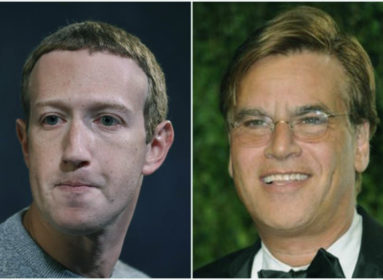
By Cindy Mindell
 As an Iranian Jew, Dr. Marc Benhuri’s life pre- and post-revolution reads like a thriller. His fictionalized memoir, Price for Freedom (2013), follows the Daniels, a prosperous Jewish family based on the Benhuris, as the Iranian Revolution heats up and the shah is overthrown. The book was adapted into a film and produced by Kenneth Del Vecchio of Justice For All Productions. Price for Freedom, starring Paul Sorvino, Sally Kirkland, and Navid Negahban (Homeland, American Sniper), premiered at the Hoboken International Film Festival in 2015.
As an Iranian Jew, Dr. Marc Benhuri’s life pre- and post-revolution reads like a thriller. His fictionalized memoir, Price for Freedom (2013), follows the Daniels, a prosperous Jewish family based on the Benhuris, as the Iranian Revolution heats up and the shah is overthrown. The book was adapted into a film and produced by Kenneth Del Vecchio of Justice For All Productions. Price for Freedom, starring Paul Sorvino, Sally Kirkland, and Navid Negahban (Homeland, American Sniper), premiered at the Hoboken International Film Festival in 2015.
In 1964, as part of the Shah of Iran’s Literacy Corps educational program, Jewish-Iranian Nasser Benhuri left his family and enrolled at the University of New Haven to pursue an undergraduate degree in mechanical engineering. Over the next 15 years leading up to the Iranian Revolution, after taking a new American first name, Marc Nasser Benhuri would go on to earn a dual degree in dental surgery and prosthodontics from the University of Pittsburgh, pioneer the field of implant dentistry and establish a department at Columbia University, and build several automotive-parts factories in the U.S. and pre-revolutionary Iran.
He would also become intricately woven into the politics of his homeland and the Middle East, witnessing firsthand the inception of Islamic terrorism. As a child in Iran, Benhuri had attended both a French-Catholic school, where he became fluent in French and familiar with Christianity, and an Islamic school, where he learned Arabic, Islam, and Shari’a law.
Later, as a dentist and dental surgeon, Benhuri treated leaders throughout the Middle East, including Shah Reza Pahlavi, King Hussein of Jordan, King Khaled of Saudi Arabia, the Kuwaiti and United Arab Emirates’ royal families, Sultan Qaboos of Oman, and Anwar Sadat of Egypt. In the early ‘70s, Benhuri served as an outside advisor to the shah on an agreement between the National Iranian Oil Company and an international consortium of oil corporations.
When Ayatollah Khomeini rose to power in 1979, Benhuri worked behind the scenes to save his family and friends from incarceration and murder.
“I was at the palace when the head of the Iranian military came to the shah,” Benhuri recalls. “We were walking up the stairs from the basement to the lobby and chitchatting and the generals were waiting for him. One of them got down on his knees, held the Shah’s hand and with tears in his eyes, said, ‘We are losing the country. Let me lock down the country. I’ll shut down the television and radio. No flights coming in and out of Iran. Maybe 4,000 or 5,000 people will get killed but we’ll save the country.’ The Shah said, ‘I will not kill my children.’”
After the revolution, Benhuri provided President Ronald Reagan key information to secure the release of American hostages, and as Reagan’s interpreter in negotiations with the Iranian ambassador in Switzerland. Ultimately, all 78 members of Benhuri’s family escaped Iran – 57 doctors and 21 dentists.
Today, Benhuri is director of the Benhuri Center for Laser Dentistry in Manhattan. He serves on the Board of Governors of the University of New Haven, where he was awarded an honorary doctorate of engineering last May. He was instrumental in creating the school’s newly-opened graduate program in biomedical engineering.
Benhuri is an outspoken opponent of the Iran nuclear deal, lobbying on Capitol Hill, lecturing around the country, and appearing on TV talk shows like Larry King Live and The Foxhole. He warns that President Obama is repeating the mistakes of President Jimmy Carter, whose policies, he says, helped usher in Iran’s fundamentalist Islamic government and its sponsored terrorist groups around the world.
Benhuri is very active in the Iranian underground fighting against what he calls “the Islamic terrorist occupiers of Iran.”
“Iranians, in general, were not that religious to begin with,” he says. “It’s important to note that 67 percent of Iranians were born after the revolution and they hate Islam and they’re not practicing it. Practically every mosque in Iran is empty; the government pays people to come to Friday prayers, for a show. They go to farmers in villages around Tehran and give out cash and a hot lunch, and then bus the people to a mosque in Tehran. They give them placards that say, ‘Death to America’ and ‘Death to Israel’ to hold up for the TV cameras.”
Benhuri and his counterparts provide the group with electronic devices and a secure email account, and helped set up TV stations in Los Angeles and Washington, D.C. that broadcast 24 hours a day.
“In my opinion, the next revolution in Iran is coming very soon, and it will be a women’s revolution, because women are not taking it anymore,” he says. “Khomeini set up his government exactly like Adolf Hitler: he established the Basij, a paramilitary volunteer militia like the Gestapo, who forces women to wear the hijab or punishes women for showing their hair; they flog people in the middle of the street or lash them for wearing makeup. Recently, in Tehran, three of these Basij attacked a girl who didn’t have a headscarf. The neighbors and shopkeepers attacked the Basij and beat them practically to death. More and more, the people are fighting back.”







 Southern New England Jewish Ledger
Southern New England Jewish Ledger














